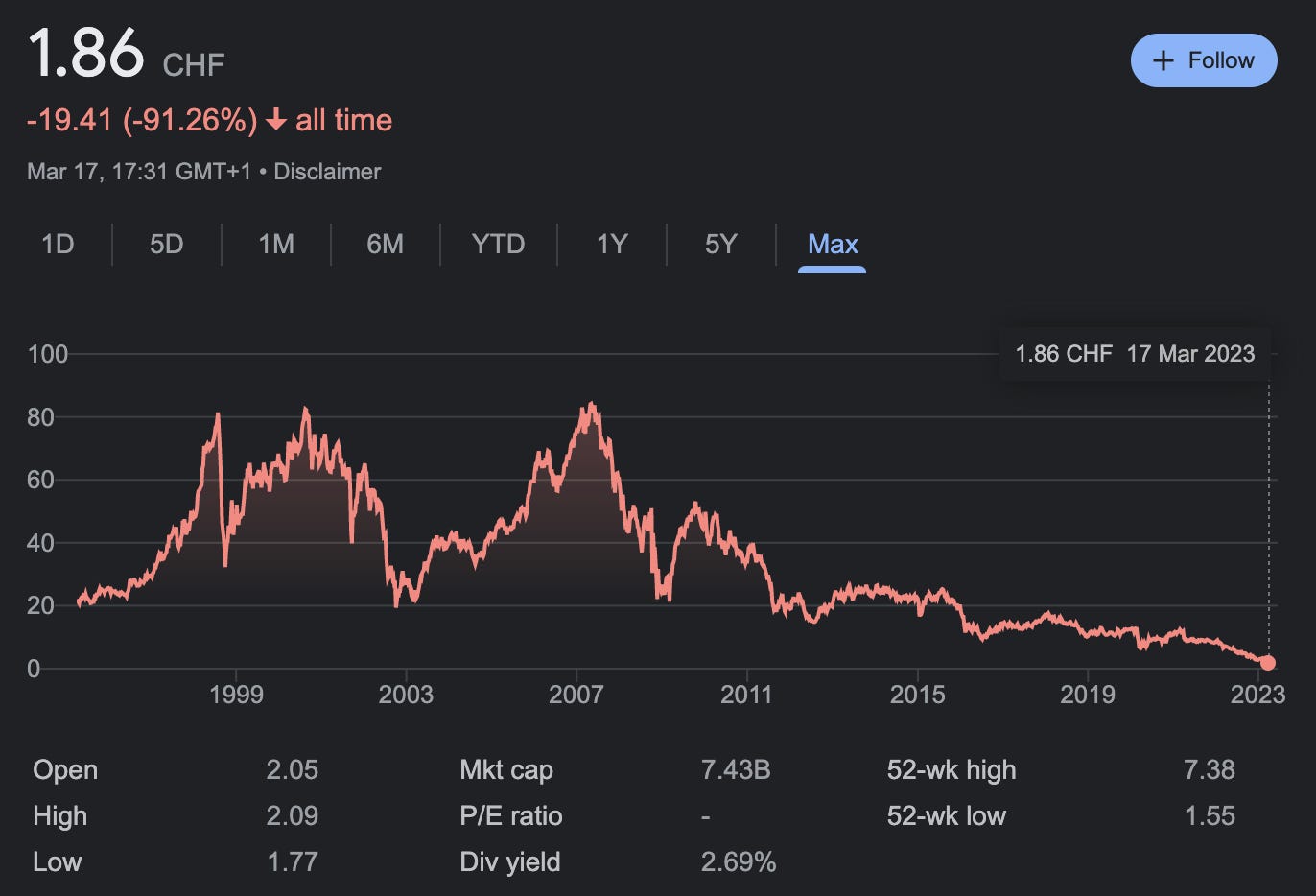UBS in talks to acquire struggling Credit Suisse 🤯🇨🇭; Stripe’s building the payments foundation for tomorrow’s AI Economy 💳; ECB brings in yet another massive rate hike 📈
FinTech is Eating the World, 17 March
Hey Everyone,
Good morning! We’re finishing off the week on Saturday but we’re finishing it off with a bang 💣 On today’s radar we have UBS which is in talks to acquire struggling Credit Suisse (we’re going to unpack it, look at the implications of this + 2 more bonus reads), Stripe (again!) that’s building the payments foundation for tomorrow’s AI Economy (they just secured a massive win!), and ECB that brings in yet another massive rate hike (what’s next? 👀). Let’s jump straight into the intriguing stuff 🌶
UBS in talks to acquire struggling Credit Suisse 🤯🇨🇭
BREAKING news🔥 UBS UBS 0.00%↑ is in discussions to take over all or part of Credit Suisse CS 0.00%↑, according to the Financial Times.
The boards of Switzerland’s two biggest lenders are reportedly set to meet separately over this weekend to consider what would be Europe’s most significant banking combination since the financial crisis 😳
How we got here? 🤔 First, let’s do a quick refresher. Founded in 1856 to finance the expansion of Swiss railroads, Credit Suisse is Switzerland’s second-largest bank by assets, trailing only UBS. The bank’s main business is managing money and creating investment products for wealthy clients around the world.
The European lender has long been dogged by issues. Here are the most significant ones:
Twin crises linked to specialist finance group Greensill Capital and family office Archegos — which both collapsed in the space of a few weeks in 2021 — resulted in billions of dollars of losses. The collapse of Archegos alone was a $5 billion hit, which was equivalent to more than a year’s worth of profit.
According to FT, the lender was also fined for its role in the $2 billion Mozambique “tuna bonds” scandal and was the first Swiss bank to be found guilty of a corporate crime after it was discovered to have laundered money for a Bulgarian cocaine cartel run by a former professional wrestler.
More recently, the bank has been contending with customer withdrawals. In October, a social-media firestorm over the bank’s health drove outflows of rich clients, as per WSJ.
The withdrawals continued through the end of the quarter and prompted the bank to reportedly reach out personally to more than 10,000 wealthy customers to reassure them of the bank’s health.
Finally, the Silicon Valley Bank happened. Investors have thus been on high alert for signs of contagion following the rapid collapse of California-based SVB last week. That led to a selloff in shares of banks around the world, including Credit Suisse.
In an attempt to shore up confidence in the country’s banking sector, The Swiss National Bank was forced to provide an emergency $54B credit line to Credit Suisse. Yet, this failed to arrest a slide in its share price, which has fallen to record lows after its largest investor ruled out providing any more capital and its chair admitted that an exodus of wealth management clients had continued.
✈️ THE TAKEAWAY
History in the making 😳 UBS has around $1.1 trillion of total assets on its balance sheet and Credit Suisse has $575 billion. A full merger would therefore be not only one of Europe’s most significant banking combinations since the financial crisis. More importantly, it would create one of the biggest global systemically important financial institutions in Europe. Increased efficiency, market share, and stronger balance should are obviously some of the biggest benefits of this potential tie-up (or I should say a shotgun wedding? 👀). On the other hand, combining the two largest financial institutions in Switzerland (and one of the largest in Europe) would be super difficult and challenging. More importantly, a larger bank could create concentration risk, with a single entity holding a significant portion of the Swiss financial market. To put this into perspective, UBS + Credit Suisse balance sheets = 260% of Swiss GDP. That’s nuts 🥜 Zooming out, if Credit Suisse would fail somehow, it would have major implications for European and US banking, as well as for the global economy. It’s a far more international and interconnected bank than SBV. And thus its demise would suggest that even major banks aren’t safe. So whether you like it or not, this weekend is undoubtedly the most important weekend for Europe in 2023.


